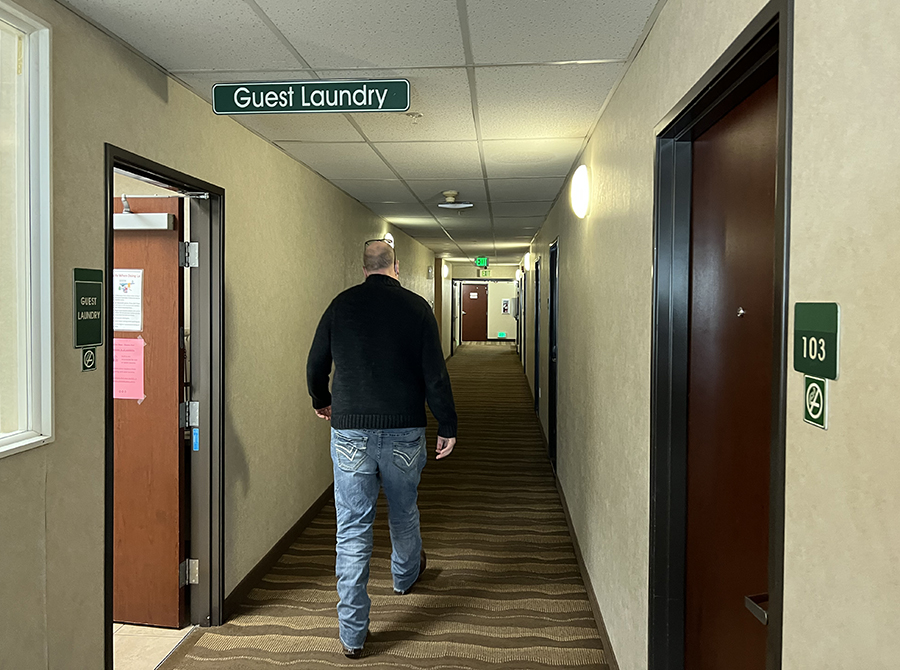The Comfort Inn sign is now wrapped in black plastic, but plenty of hotel amenities remain at River Haven, a housing program for people in early recovery run by Central City Concern.
The hotel art remains, such as a lobby photograph of a kayak docked near the Steel Bridge. A sign that designates “guest laundry” is still useful: now the washers and dryers provide laundry service for River Haven residents. The "pool rules" sign, on the other hand, will go away: at a later stage, the pool will be filled in and built out into more rooms.
There’s still a hotel-look to the upholstered furniture and wool carpet in the former conference rooms that now host group meetings for people in recovery.
And the 30-some residents of River Haven have private rooms stocked with hotel amenities. “I think it's also a cool thing that the hotel just left all their beds and the coffee makers and microwaves and little fridges and TVs,” Central City Concern’s policy director, Mercedes Elizalde, told me.
Residents of River Haven have private bathrooms with showers, another hotel perk that is often missing in single-room occupancy buildings.
River Haven, a bright red and yellow building on Northeast 102nd Avenue and Sandy Blvd., is the only Portland site from the first round of the Project Turnkey program funded by the state and administered by Oregon Community Foundation in late 2020. It provides a model for what local governments could also fund.
I’ve traveled to a number of Project Turnkey sites: the Peace at Home site in Douglas County, the Coastal Phoenix Rising site in Lincoln City, Arches Inn in Salem, The Bridge Shelter Program in Hillsboro. I drove by Operation Homefront in Klamath Falls.
There are also sites in Ashland, Bend, Corvallis, Forest Grove, McMinnville, Medford, North Bend, Pendleton and Redmond. All in all, the first round of Project Turnkey transformed 19 former hotels and motels into housing around the state for people exiting homelessness. The legislature funded a second round in February.
Each place I’ve gone, I’ve noticed a similar trend: the amenities of a hotel are well-suited for a quick turnaround housing model. The hospitality industry is set up to be welcoming and durable at once, qualities that translate to providing housing to people exiting homelessness.
All the sites I’ve visited have both housed people exiting from homelessness — due to the 2020 fires or otherwise — while providing particular niches. Peace at Home for instance, helps people escape violent situations. Phoenix Rising has provided a number of recuperative rooms to people who are exiting hospitals and would otherwise move back to homelessness. River Haven specializes in recovery.
“The overall vision is a stabilization program,” explained Joey Johns, associate director of supportive housing and reentry programs at Central City Concern. If people are “struggling with addiction, or houselessness, or mental health, or whatever the scenario is, they come in here, start the stabilization process, and work with case managers.”
Central City Concern has about half of the 70 hotel rooms filled, a staggered rollout as they bring together more operating funds, and, down the road, renovate more of the building. There’s additional parking lot land where they could extend the housing.
The Native American Rehabilitation Program refers people to 15 of the rooms, as does the Central City Concern’s Puentes program, and each provides culturally specific recovery models.
As I walked around River Haven with Johns and Elizalde, we stopped in a kitchen where a resident was cooking mac and cheese.
Then, we ran into River Haven case manager, Ricco Mejia, who proudly described a woman who recently transitioned out of the program and back to her family. He described himself as a cheerleader for people’s recovery.
“We stay excited,” he said, “and right when we get kind of exhausted and a little tired, something happens that really energizes our spirit and attitudes around here.”
He began to describe how a person could transform destructive behaviors — “hazards,” is how he said it — until they “become assets to their families and their communities.”
His perspective was hard-earned.
“At one time, I was one of the worst hazards Multnomah County had to deal with,” Mejia said with a grin. “I went through five (of Central City Concern’s) programs, and today they say I’m one of the best assets.”
The hotels are there, as are the successful models. What’s missing? The political will.
As he discussed this philosophy — that a person’s recovery can be healing not only for themselves but for a community — he began to apply it to the very building we stood in.
Shelters and transitional housing can be the stuff of NIMBY nightmares, after all. But Mejia sees it differently:
“One thing folks don't realize is actually how much of an asset” such a program can be, he said. “This is something that's just full of positivity, all these positive people trying to do positive stuff, right?”
This really hit me. Mejia is right. The transformation of these spaces are healing for the larger society, not just individuals.
Street Roots has advocated for this kind of model since the first months of the pandemic, and it’s heartening to meet people who, in fact, are benefiting.
“We are housing people pretty quick here,” Elizalde pointed out. “That's awesome in comparison to where you usually take two or three years to get it up.”
That's the goal: people deserve to have safe, stable places to live as quickly as possible, but over time, if purchased, these same properties can be developed for longer-term housing. It’s a leading tenet of the 3000 Challenge campaign that Street Roots supports: open up more housing quickly for people experiencing homelessness, paired with services for those who need them.
There are many more hotels in Portland similar to River Haven: in good shape, with hotel amenities, housing 70-80 people. Some have parking lots that could be developed into more housing later.
I’ve surveyed some of these properties with Elizalde, as well as Brandi Tuck at Portland Homeless services, as we advocate for a Portland Turnkey modeled after Project Turnkey.
The hotels are there, as are the successful models. What’s missing? The political will.
Correction: An earlier version described this as the only Multnomah County Project Turnkey site. There are two other sites in Multnomah County; it is the only Portland site.
Street Roots is an award-winning weekly publication focusing on economic, environmental and social justice issues. The newspaper is sold in Portland, Oregon, by people experiencing homelessness and/or extreme poverty as means of earning an income with dignity. Street Roots newspaper operates independently of Street Roots advocacy and is a part of the Street Roots organization. Learn more about Street Roots. Support your community newspaper by making a one-time or recurring gift today.
© 2022 Street Roots. All rights reserved. | To request permission to reuse content, email editor@streetroots.org or call 503-228-5657, ext. 404



